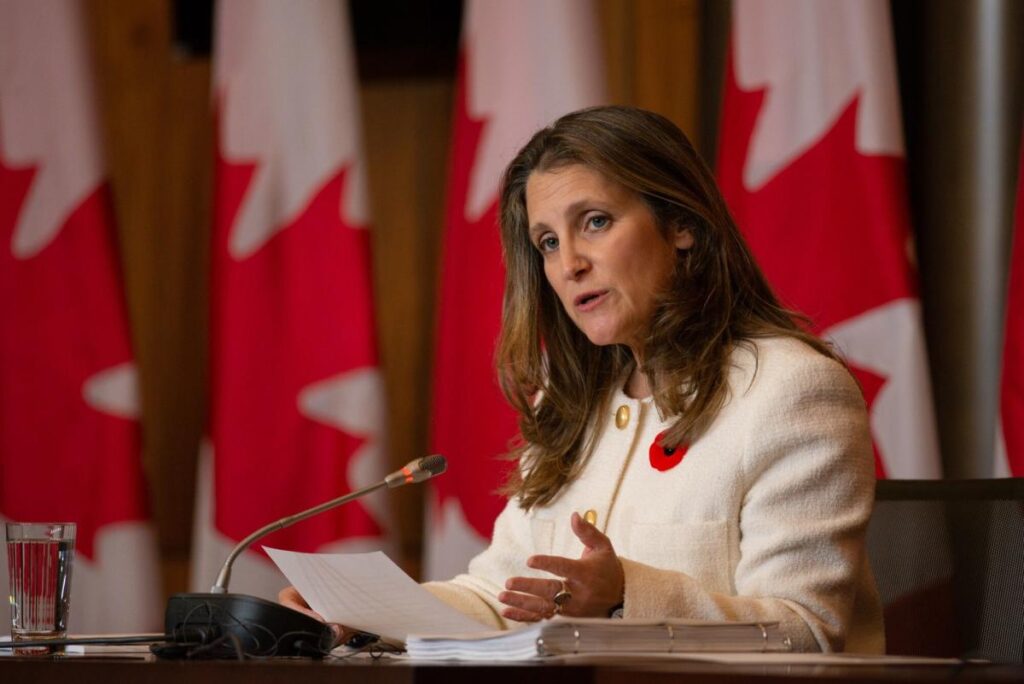(Bloomberg) — Finance Minister Chrystia Freeland is planning to raise billions of dollars from banks and insurance companies by changing the tax rules for dividends they get from Canadian firms.
Most Read from Bloomberg
In a measure that officials billed as closing a loophole, Canada will begin treating dividends received by financial institutions from holding domestic shares as business income. It’s expected to bring in C$3.2 billion ($2.3 billion) over five years, starting in 2024.
Banks and other financial firms have used complex tax planning for years to effectively exclude these dividends from their income, lowering their overall tax burden. The new tax will apply to shares that are held as mark-to-market assets — not to dividends paid from one subsidiary to another. The measure won’t affect shares held by financial institutions on behalf of clients.
The change comes as Prime Minister Justin Trudeau’s government faces a deteriorating fiscal outlook and slowing economy, while it ramps up spending to help residents cope with inflation, prop up the health-care system and compete with the US on low-carbon initiatives. The government abandoned plans to balance the budget by 2028 and intends to run larger deficits every year until then.
Trudeau and Freeland have targeted the financial sector for new revenue after the federal debt ballooned to pay for income support and other programs in the Covid-19 pandemic. The government previously introduced a corporate tax hike on large banks and life insurers and a one-time windfall tax on financial firms called the Canada Recovery Dividend. Those two measures were projected to raise more than C$5 billion over five years, according to a government analysis last year.
A spokesperson for the Canadian Bankers Association couldn’t immediately provide comment.
Minimum Tax Rate
Freeland’s new budget, released Tuesday in Ottawa, also proposed changes to an “alternative minimum tax” that will apply to some Canadians earning more than C$300,000 annually. The hike in the special tax rate to 20.5%, from 15% — which comes with a fourfold increase in the income level at which it begins to apply – is expected to generate C$3 billion over five years.
“We’re making sure the very wealthy and our biggest corporations pay their fair share of taxes, so we can afford to keep taxes low for middle class families – and invest in our health care system and social safety net,” Freeland, who’s also Canada’s deputy prime minister, said in prepared remarks.
Some of the highest-income Canadians pay little to no personal income tax annually through “excessive use” of deductions and credits, the government said.
The alternative minimum tax, implemented in 1986, was intended to ensure that the wealthiest earners can’t escape taxes. Under the amendments, more than 99% of the AMT paid by individual Canadians would be paid by those who earn more than C$300,000 per year, and about 80% of the AMT paid would be by those who earn more than C$1 million annually, the government said.
These tax measures followed a 2% tax on share buybacks for public firms announced late last year. The buyback tax will come into effect on Jan. 1, 2024.
Rona Ambrose, a former Conservative lawmaker who’s now deputy chairwoman of Toronto-Dominion Bank’s securities division, said the government’s plan for large deficits is worrisome because it inevitably forces tax increases.
“Even when times were good, this is a big spending government and they’ve spent too much for too long,” Ambrose said on BNN Bloomberg Television. “And now we’re in a situation where we had to respond to a certain extent to what was happening in the United States, the geopolitical environment, the Inflation Reduction Act,” in a weaker economic situation.
Others were more positive about the fiscal plan.
“We’re encouraged to see a proposed tax on dividends received by financial institutions,” D.T. Cochrane, an economist and researcher with lobby group Canadians for Tax Fairness, said by email. “Hopefully, this signals a willingness for the government to begin taxing investment income the way it taxes regular income.”
(Adds response for tax lobby group in final paragraph)
Most Read from Bloomberg Businessweek
©2023 Bloomberg L.P.


